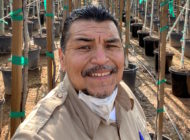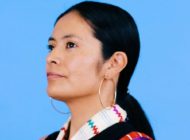Corporate or federally subsidized jobs require citizenship leading undocumented students to study majors in less restrictive fields

Lizbeth often studies in the library from 8 a.m. till 9 p.m. in between classes.
By VIRGINIA ISAAD
EL NUEVO SOL
All of the students’ names have been changed to protect their identity.
Lizbeth, 23, had gone her entire life without questioning her status in the U.S. until applying for college when she was asked to provide a Social Security number she didn’t have.
Suddenly the future she had once envisioned for herself was completely out of reach and she had to reconcile her aspirations with the limited options of an undocumented student.
Now in her last year at California State University, Northridge, Lizbeth finally decided to stick with journalism with a minor in marketing, after having a run with three other options.
“I would like to start my own (public relations) business or work at a non-profit to gain experience,” she says.
She initially chose biology. But when discussing her status with a university counselor he advised her against it, due to the hardships she would face trying to find a job.
She, like so many other AB 540 students, has had to adjust to their life according to the limited opportunities of undocumented immigrants.
AB 540 legislation allows students who have attended high school in California and intend to apply for legal status to pay in-state tuition.
“The mere fact of going to college is a privilege,” says Lizbeth.
As a school under the AB540 state law, CSUN offers respite and resources through the Dreams to be Heard (DTBH) student club as well as faculty and counselors.
Jose Luis Vargas, Educational Opportunity Program (EOP) Director, is an AB540 advocate and adviser for DTBH. He has met with graduates who work in fields not related to their university degree.
“Students come to me saying ‘I have a degree in psychology and I’m washing cars’,” says Vargas. “Even if they wanted to gravitate toward certain degrees, there is nothing out there for them.”
There are no restrictions for AB540 students in regards to choosing a major but limitations exist once they graduate, as certain fields put greater emphasis on providing citizenship paperwork.
“Students tend to gravitate toward kinesiology, communication studies, art, graphic design,” says Vargas. “These are good majors because they are sub-contracted by larger corporations and they don’t have the same level of restrictions.
“Health and human development, engineering, computer science, science and mathematics anything that leads to a potential graduate or professional degree in medicine or research all those are difficult majors,” Vargas goes on to explain. “Graduate schools and those careers are subsidized by the federal government. All those fields that have a connection with the federal government have a citizenship requirement.”
Maria, 20, started out in graphics design and then nutrition and dietetics but found no interest in either subject.
She started attending DTBH meetings on campus during Fall 2010 and was inspired to change her major to political science with a minor in Chicano Studies.
“I felt like I had a group I could relate to, like they understood me,” she says. “I noticed how politically we could learn as AB 540 students. My passion is helping others so I would like to be an immigration lawyer.”
She is aware that for the time being she will not be able to pursue a practice in law but she remains dedicated to her academic pursuits.
“I’m taking it day by day and learning,” she says. “There’s hope for licensing as a lawyer, until then I’ll keep pursuing higher education.”
Vargas agrees that fields like political science can lead self-sustaining careers for undocumented students.
“The political science major can work in a small law office doing research,” says Vargas. “If students can demonstrate that they have the ability, the skill and the knowledge to perform the job responsibilities, (small corporations) look at that first and foremost.”
Miguel, 22, is a Spanish-language major who admits, “it was never ‘I want to make money out of this’” regarding his major.
After graduating, he plans to continue working at the restaurant where he is currently employed in the hopes of moving up as manager.
“I did want to be a teacher, but I can’t get credentials,” he says.
He volunteers at his former high school by giving presentations on the plight of being undocumented and options available to them.
A soccer aficionado who “could kick a ball” before he could walk, Miguel would like to go into sports writing and mentions Mexican sports commentator, Jose Ramon Fernandez as one of his idols.
He mentions how he could return to Mexico and learn about sports commenting but he admits Mexico is not home to him in the way the United States has become.
“Being undocumented is an impediment. If I went to Mexico, I’d have to stay,” says Miguel. “It would be like going to a foreign country to me. I wouldn’t want to make it my home; this is home to me.”
Vargas has a three-step plan he believes guides students in the direction best suited to their needs and desires.
“Always look at legal options,” Vargas emphasizes as the first major step. “I encourage them to research… see if there’s anything we can do to at least begin the process of legalization. Always explore what options are available to you.”
With the use of the controversial use of E-Verify, a site that can check a potential employees’ legal status, Vargas admits it’s “become even more restrictive.”
His second suggestion is for students to consider how committed they are to remain in the U.S. as they can return to their home country and utilize their degree in a way they couldn’t in the U.S.
Vargas laments how some of the “best performing students” are kept from contributing due to their status but upholds the importance of ultimately choosing what will give them the most satisfaction.
“No one can take away your education, it will last you a lifetime,” Vargas says. “Go for not only what you’re good at but what you get a kick out of doing.”
The recent passage of AB 131, which will allow undocumented students to receive Cal Grant money that is left over in 2012, is a boon for future students. Yet there have been no advancements for the undocumented in the workforce.
“ They make significant contributions to the economy, society and the workforce,” says Vargas. “They give more than they are taking.”
Miguel recalls a song from Latin artists Los Tigres del Norte (The Tigers of the North) titled La Jaula de Oro (The Golden Cage) that particularly spoke to him.
He explains, “(The song) talks about the undocumented caged in a cell despite success, it’s how my dad feels. It represented our family.”
The lyrics include: “Aqui estoy establecido/ en los Estados Unidos/ diez años pasaron ya/en que cruce de mojado/ papeles no he arreglado, sigo siendo un illegal/ De que me sirve el dinero/ si estoy como prisionero/ dentro desta gran nacion/ cuando me acuerdo hasta lloro/ aunque la jaula sea de oro/ no deja de ser prision.”
To hear more from Jose Luis Vargas, click on the audio:
[audio:https://elnuevosol.net/wp-content/uploads/2011/11/ENSvargas-1.mp3|titles=Jose Luis Vargas on ENS]
For more info on undocumented students visit:
http://cadreamnetwork.org/
Scholarships
DTBH meet Thursdays from 11am-12:30pm in the Chican@ house, contact the club for more info.












